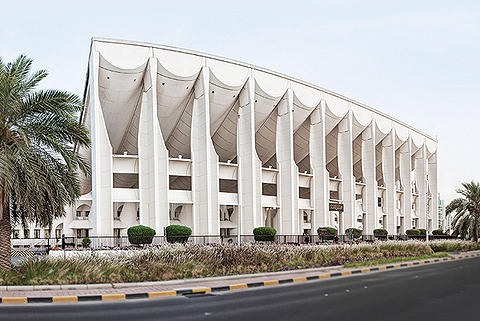Kuwait, Saudis 'close' to neutral zone deal - Experts warn of long-term low oil price
KUWAIT: The National Assembly yesterday approved a motion to ask its public funds protection panel to launch a probe into allegations that the designs of Al-Zour Refinery are faulty. The Assembly gave the committee two months to complete its investigation, which should focus on alleged squandering of public funds, with MP Faisal Al-Kandari claiming that billions of dinars have been squandered. The Assembly also approved a motion to ask the Audit Bureau to examine the contract records and data of the solar energy project in the area of Shaqaya, which was launched a few years ago with the aim to produce 15 percent of Kuwait's energy by 2030 from renewable sources.
MP Khalil Abul reiterated that a grilling will be filed to question the oil minister, but he did not specify a date. The Assembly however agreed to delay a debate on the issue after a request by the government because Oil Minister Bakheet Al-Rasheedi is in Saudi Arabia on an official visit. The $15 billion Zour project is expected to come on-stream next year. The state-of-the-art refinery has a capacity of 615,000 barrels per day and is part of a huge energy complex near the border with Saudi Arabia.
Rasheedi is in Riyadh to hold talks with Saudi officials over the dispute in the neutral zone, which led to halting production at two oilfields in the zone over three years ago. Foreign Minister Sheikh Sabah Al-Khaled Al-Sabah said the two countries are capable of sorting out the differences in the area, which used to pump over 500,000 barrels per day shared equally by the two countries.
A report in The Wall Street Journal yesterday said Saudi Arabia and Kuwait are close to restarting operations in the neutral zone after the US intervened to broker an agreement, according to oil officials familiar with the discussions. The potential return of the fields would unlock key production capacity as the US considers phasing out exemptions it awarded to some buyers of sanctioned Iranian oil, and as markets see an expected tightening next year.
Washington has been trying for months to broker a deal between Saudi Arabia and Kuwait over the contested strip of oil-rich land. The WSJ said Kuwait's foreign ministry - rather than its oil arm - has been the staunchest opponent to any deal to resume output, according to people familiar with the matter. But the ministry's opposition softened after the US State Department promised Kuwait it would guarantee its security going forward, according to people familiar with the matter.
"We continue to encourage Kuwait and Saudi Arabia to reach agreement on restarting oil production in the Partitioned Neutral Zone," a State Department spokesperson said. If an agreement is finalized, the fields would restart pumping in the first quarter, according to people familiar with the matter. Chevron Corp, which jointly operates one of the fields with Kuwait, said it maintains "readiness for a production restart when that time comes." The US major said yesterday that it "recently undertook an operational readiness review, which tests all elements to ensure a smooth transition".
Meanwhile, experts warned yesterday that Gulf states, which depend heavily on energy exports for most of their revenues should brace for a long period of low oil prices and subdued economic growth. Signs of an "economic war" between the United States and China, the world's largest economies, and an expected global economic slowdown starting next year will dampen demand for oil, the experts told a conference in Dubai.
"Oil prices will remain low for a long period," former Lebanese minister of economy and trade Nasser Saidi told the one-day Arab Strategy Forum. A cooling of the global economy will reduce demand for oil, which coupled with rising competition from renewable energy sources and shale crude will lead to low oil prices, said Saidi, who is now a consultant. "This will negatively impact growth in the whole (Arab) region … The whole area will face a financial and economic crisis," he said.
The six member nations of the Gulf Cooperation Council (GCC) earn more than 80 percent of their revenues from energy. The GCC states - Bahrain, Kuwait, Oman, Qatar, Saudi Arabia and the United Arab Emirates - have lost hundreds of billions of dollars in oil revenues since crude prices crashed in mid-2014. Oil prices later rebounded after OPEC and non-OPEC producers reduced their production. But they slid again when producers boosted output earlier this year to compensate for expected losses from Iran because of the re-imposition of US sanctions.
Oil prices have lost more than a quarter of their value compared with a four-year peak over $85 a barrel seen in October, with benchmark Brent crude trading at around $61 a barrel in London yesterday. World Bank senior vice president Mahmoud Mohieldin warned that economic growth in the GCC region was still dependent on oil price movements. "Now, we are at a time of uncertainty … Growth in Gulf states is forecast at three percent next year … but this could be revised," following the drop in oil prices, Mohieldin said. He said that the unemployment rate among Arab youths is 30 percent and higher among females, adding that growth is not producing enough jobs.
OPEC and non-OPEC producers decided last week to cut production by 1.2 million barrels a day from January to shore up prices, which some analysts warned would hit economic growth. "We think that the OPEC deal will have an overall negative impact on GDP (gross domestic product) growth in the Gulf over the coming quarters," London-based consultancy firm Capital Economics said last week.
By B Izzak











